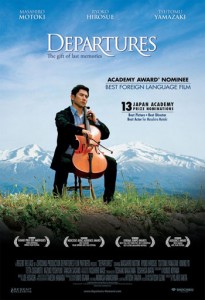 When young Daigo Kobayashi loses his job as a cellist with a Tokyo symphony and returns to his hometown looking for work, he answers a newspaper ad from what seems to be a travel agency. It is only when he is long into the interview that he discovers, to his horror, that he is being hired as a nokanshi, one who prepares the dead to be sent on their final journey. Deeply ashamed but needing the money, he hides the nature of his work from his wife and family. They learn the truth and are disgusted that he would take such a degrading job. But Daigo refuses to quit, having realized that his artful assistance to grieving families creates opportunities for healing and, at times, a celebration of life in a moment of great sadness.
When young Daigo Kobayashi loses his job as a cellist with a Tokyo symphony and returns to his hometown looking for work, he answers a newspaper ad from what seems to be a travel agency. It is only when he is long into the interview that he discovers, to his horror, that he is being hired as a nokanshi, one who prepares the dead to be sent on their final journey. Deeply ashamed but needing the money, he hides the nature of his work from his wife and family. They learn the truth and are disgusted that he would take such a degrading job. But Daigo refuses to quit, having realized that his artful assistance to grieving families creates opportunities for healing and, at times, a celebration of life in a moment of great sadness.
Departures is a beautiful movie about a hard subject: the terrible loss and difficult questions that accompany death. Working in the midst of great sadness, the humble and respectful Daigo lovingly cleanses and prepares the bodies of the departed for their final journey. As he works, he opens the eyes of the gathered loved ones to the precious miracle that is life, and the privilege they have been given to live and love deeply, if only for a short time.
“The rite of encoffinment is to prepare the deceased for a peaceful departure. Please come closer and watch.” — Daigo Kobayashi’s invitation as he begins the ancient rituals he has learned from his employer.
In most western countries, the preparation of a body for burial is done behind closed doors. In Japan, these preparations are often performed in the open, before family and friends. They are practiced discreetly and with great respect, always assuring, through artful coverings with robes and blankets, that the dignity of the deceased is protected. The family is invited to participate in small ways, and in so doing, they are given the opportunity to say farewell and offer one last act of service to the one they have loved.
Departures won the 2009 Academy Award for Best Foreign Film. The musical score is achingly beautiful, leaning heavily on solo cello compositions performed by Daigo in flashbacks to his youth, as well as in the present-day, his cello expressing the conflicting emotions he feels about his life and his new career.
In most cultures handling the dead is considered distasteful work. As much as possible, we avoid facing up to the realities of death and dying, realities that make us deeply uncomfortable, even fearful, especially when one’s religious beliefs (or lack thereof) fail to provide any answers about what, if anything, lies beyond. So, we avoid talking about death, and when we do, we speak mostly in euphemisms. We live in a comfortable denial about this final transition until it unexpectedly slaps us in the face.
In the Christian faith, death is both an ending and a beginning. More correctly, it is a continuation of life in a new, and permanent, home. What we often refer to as Heaven is in fact not so much a reward following a life well-lived but a new residence, the home we were created for from the beginning of time, a home in the house of God our Father. (John 14:2,3)
Christ has been raised from the dead. He is the first of a great harvest of all who have died. So you see, just as death came into the world through a man [Adam], now the resurrection from the dead has begun through another Man [Christ]. Just as everyone dies because we all belong to Adam, everyone who belongs to Christ will be given new life. — 1 Corinthians 15:20-22, NLT
Departures is a courageous movie about a very difficult subject, one that couldn’t have been made in the US, where box-office appeal seems to drive every creative decision and an addiction to special effects has made real life seem dreary by comparison. But it’s a movie you will never forget, and one that may stimulate some serious contemplation about one of life’s biggest questions: what happens when we die?


Thanks Charlie! Just added to my Netflix queue.